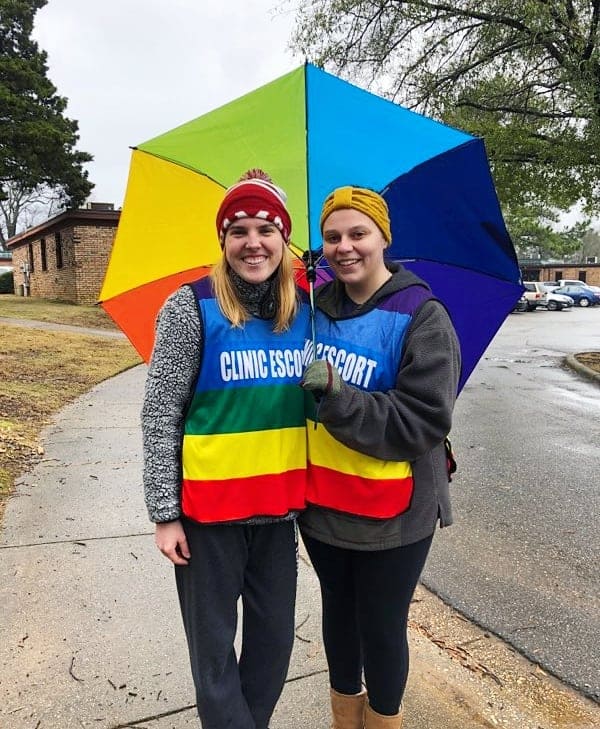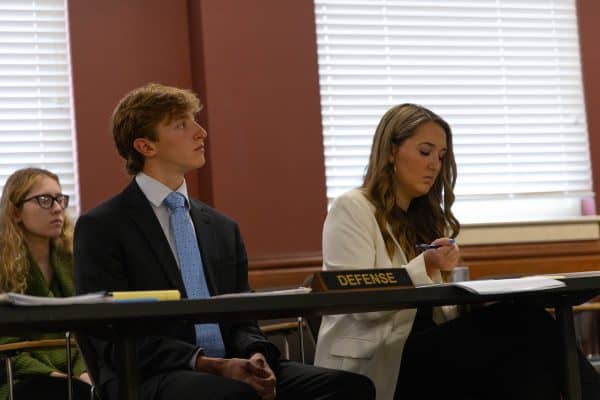WAWC clinic defenders provide support to patients
October 17, 2019
Clinic defenders combat a spectrum of protesters in order to guide abortion patients into the West Alabama Women’s Center. Though the job is sometimes dangerous and mentally exhausting, defenders say helping women feel comfortable in the midst of what can be a distressing time is uplifting.
The West Alabama Women’s Center (WAWC) clinic defenders are a group of volunteers who, among other things, walk patients of the center from their cars to the clinic. With anti-abortion rights protestors often present at the clinic, this role is one that allows patients to more comfortably enter the facility.
The WAWC is one of three abortion clinics in the state. As such, it sees patients who travel from all over Alabama to undergo safe abortions. Upon arrival, clinic defenders can comfort the patients who might be overwhelmed by protestors.
Helmi Henkin, former chair of the West Alabama Clinic Defenders and a UA alumna, said patients experience a variety of barriers even before they get to the clinic and experience protestors’ scrutiny.
“It’s expensive to travel, to have to find childcare, to have to find reliable transportation,” Henkin said. “A lot of people have to find lodging because it’s easier to stay in Tuscaloosa for those 3 days rather than drive back and forth. On top of all these logistical barriers, the burden of being harassed by these protestors, we serve a really important role at the clinic making people feel safe, making sure the environment is as peaceful as possible.”
Annabeth Mellon, a senior majoring in gender and media studies and creative media and president of Unite for Reproductive & Gender Equity UA (URGE), was a clinic defender for over two years. She said that although the protestors have a physical line they’re not allowed to cross, their proximity to the building can still be distressing for patients.
“If I could tell a patient, ‘I know they’re yelling at you, but I promise you they cannot cross that line. I am here to make sure they do not cross that line, and you are going to be safe,’ it felt really good,” Mellon said. “It felt like I was taking this issue from one that I felt really strongly about in an ideological sense and turning it into something real, into concrete action.”
Mellon didn’t always feel strongly about reproductive rights advocacy. Going into high school, she said, she was anti-abortion rights. When Mellon moved out of her parents’ house, that was when her mindset began to change.
“When I moved out, I was able to come out as bi,” Mellon said. “As soon as I became OK with that, it became a matter of, ‘OK, if my parents were wrong about this, what else were they wrong about?’ If they [were] wrong about being gay being a sin, then what else is not a sin that I was told was a sin?”
It’s not unusual that patients open up to the clinic defenders. More rarely, some speak with the protesters. One such patient, a woman who was anti-abortion, made a particular impact on Mellon. The woman explained to the protestors that her doctor told her she would die if she went through with the pregnancy due to her sickle cell anemia.
“They told her that she should be willing to lay down her life for her baby,” Mellon said. “And she was just so shook up about it. I get chills every time I tell that story because you can’t just tell someone, ‘You should be willing to die.’”
Protestors are typically vocal on-site, but sometimes they cross the line into physical violence and threats.
“One of our escorts got hit by a car while I was standing right next to her,” Henkin said. “I could’ve totally been hit if I hadn’t moved out of the way. I kept a list in my pocket for months of people that the FBI had said threatened to bomb our clinic.”
But violence won’t stop Henkin from standing up for what she believes in.
“Abortion is health care,” Henkin said. “And I’m not about to shrink myself for my views to fit a cultural standard.”
Aside from logistical barriers and protestors, there is another obstacle Mellon said patients have to overcome when opting to abort their pregnancy.
“[The patients] would talk about how hard it was to find an abortion clinic when all they would find are these fake clinics who would tell them, ‘We’re here to help you make a choice’ and then would actually just trap them and give them misinformation,” Mellons said. “How they didn’t know which clinics they could trust.”
Crisis pregnancy centers (CPCs) are facilities which do not provide abortion services, but provide parental resources and are often religiously affiliated. According to reproaction.org, an abortion and reproductive rights advocacy group, Choices Pregnancy Clinic, located in the same group of businesses as WAWC, is a CPC.
Director of Choices Pregnancy Clinic, Sandi Horsley, said that because of the proximity, some clients get confused about which pregnancy center they have an appointment at.
“We immediately bring them back into the hall and say, ‘We don’t see you on our schedule. I don’t know if you just walked in or if you have an appointment possibly somewhere else, but we just want you to know what we do for free, which is the free pregnancy test and the free ultrasound, and so you’re welcome to stay with us. We are glad to have you here, but we wanted to make you aware of that,’” Horsley said.
Horsley said the facility aims to assist parents and potential parents-to-be with resources and parenting courses, but stays out of the mother’s decision to her carry her pregnancy to term.
“We don’t refer anyone for abortion,” Horsley said. “I think that’s the lady’s choice. I don’t think that’s our position. We think that our job is to offer them the opportunity to parent and to bring life into the world.”
The facility provides free ultrasounds for pregnant women to see if their pregnancy is viable. If they should choose to give birth, Horsley said they try to do anything that could “make their life better.” The facility has expanded in the past years and is now able to provide courses for car seat safety, sleep safety, nutrition and CPR, as well as career and resume building courses for parents.
“We just do the ultrasounds and we just discuss their options with them,” Horsley said. “Some choose to leave and go do an abortion. We tell them that we are here for them should they make that choice. We are here, whatever they need.”











